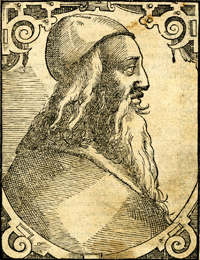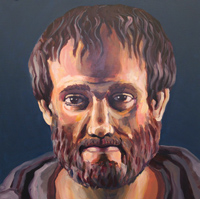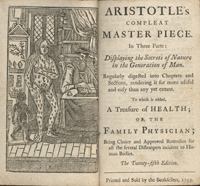| Profiles > Philosophy > Aristotle | |||||||||||||||||
|
|||||||||||||||||
|
Aristotle of Stagira is one of the two most important philosophers of the ancient world, and one of the four or five most important of any time or place. He was not Athenian,but he spent most of his life as a student and teacher of philosophy in Athens. As the Macedonians came to dominate Greece, Aristotle returned to Athens and set up his own philosophical school at the Lyceum, where he taught from 335 until 323. What we have of Aristotle's writings are mostly lectures he gave at the Lyceum in these years."Aristotelian Corpus"is probably derived from the lectures that he gave in the Lyceum.Their dry style and uneven structure is partly due to the fact that they were lecture notes never intended for publication and partly a result of the fact that they were patched together into their present form by editors many centuries after Aristotle's death. Aristotle published many popular works admired for their lively style, but none of these have survived. | ||||||||||||||||
|
Aristotle's published writings were all lost or destroyed in the centuries after his death, and what we have are lectures, or notes on lectures, that Aristotle gave at the Lyceum. These works were first collected two centuries after Aristotle's death by Andronicus of Rhodes. As a result, we do not know the chronology of Aristotle's writings, and are unsure if Andronicus arranged them in the order that Aristotle had intended, or if all the works collected by Andronicus were written by Aristotle. We can also be quite confident that what Andronicus collected constitutes less than one-third of all Aristotle's writings. However, even this small collectionis impressive. |
|||||||||||||||||
|
|||||||||||||||||
|
|||||||||||||||||
Counterbalancing the idealism of Plato's philosophy is Aristotle's background as the son of a doctor. Aristotle was probably brought up to pursue a medical career, and his writings on biology show a very sharp understanding of anatomy. Throughout his writings, Aristotle refers to biology as a paradigm for making sense of the world, much as Plato refers to mathematics. This emphasis on biology leads Aristotle to favor close observation of natural phenomena and careful classification as the keys to making sense of things. As a result, his philosophy is much more empirically oriented than Plato's, and Aristotle rejects the idea that we can only make sense of this world by appealing to invisible entities beyond it. Some areas of inquiry in which Aristotle makes a fundamental contribution are as follows: |
|||||||||||||||||
| Logic - Aristotle's "Prior Analytics" constitutes the first attempt to formulate a system of deductive formal logic,based on the theory of the "syllogism". The "Posterior Analytics" uses this system to formulate an account of rigorous scientific knowledge. "Logic", as Aristotle conceives it, also includes the study of language, meaning, and their relation to non-linguistic reality; hence, it includes many topics that might now be assigned to philosophy of language or philosophical logic. | |||||||||||||||||
| The study of nature - About a quarter of the corpus consists of works concerned with biology. Some of thesecontain collections of detailed observations. Meteorology contains a similar collection on inanimate nature. Others try to explain these observations in light of the explanatory scheme that Aristotle defends in his more theoretical reflections on the study of nature. These reflections, especially in Physics and in Generation and Corruption, develop an account of nature, form, matter, cause, and change that expresses Aristotle's views about the understanding and explanation of natural organisms and their behavior. Natural philosophy and cosmology are combined in On the Heavens. | |||||||||||||||||
| Metaphysics - In his reflections on the foundations and presuppositions of other disciplines, Aristotle describes a "universal science of being", the concern of Metaphysics. Part of this universal science examines the foundations of inquiry into nature. Aristotle formulates his doctrine of substance, which he explains through the connected contrasts between form and matter, and potentiality and actuality. One of his aims is to describe the distinctive and irreducible character of living organisms. Another aim of the "universal science" is to use his examination of substance to give an account of divine substance, the ultimate principle of the cosmic order. | |||||||||||||||||
| Philosophy of mind - The doctrine of form and matter is used to explain the relation of soul and body, and the different types of soul found in different types of living creatures. In Aristotle's view, the soul is the form of a living body. He examines the different aspects of this form in plants, non-rational animals and human beings, by describing nutrition, perception, thought, and desire. His discussion in On the Soul, and also in Parva Naturalia covers topics includingphilosophy of the mind, psychology,physiology, epistemology, and theory of action. | |||||||||||||||||
| Ethics and politics - Nicomachean Ethics, Eudemian Ethics, Magna Moralia – In Aristotle's view, the understanding of the natural and essential aims of human agents is the right basis for a grasp of principles guiding moral and political practice. These principles are expressed in his account of human wellbeing, and of the different virtues that constitute a good person and promote wellbeing. The description of a society that embodies these virtues in individual and social life is a task for "Politics", which also examines the virtues and vices of actual states and societies, measuring them against the principles derived from ethical theory. | |||||||||||||||||
| Literary criticism and rhetorical theory - Poetics, Rhetoric -- These works are closely connected both to Aristotle's logic and to his ethical and political theory. More than 2300 years after his death, Aristotle remains one of the most influential people who ever lived. He contributed to almost every field of human knowledge then in existence, and he founded many new fields. According to the philosopher Bryan Magee, "it is doubtful whether any human being has ever known as much as he did". Among countless other achievements, Aristotle was the founder of formal logic, pioneered the study of zoology, and left every future scientist and philosopher in his debt via his contributions to the scientific method. Despite these achievements, the cost of Aristotle's errors is considered by some to have held back science considerably. Bertrand Russell notes that "almost every serious intellectual advance started with an attack on some Aristotelian doctrine". Russell also refers to Aristotle's ethics as "repulsive", and calls his logic "definitely as antiquated as Ptolemaic astronomy". Russell notes that these errors make it difficult to do historical justice to Aristotle, until one remembers how much of an advance he made upon all of his predecessors. |
|||||||||||||||||
|
Credits
http://www.sparknotes.com/philosophy/aristotle http://en.wikipedia.org/wiki/Aristotle http://www.muslimphilosophy.com/ip/rep/A022 |
|||||||||||||||||











